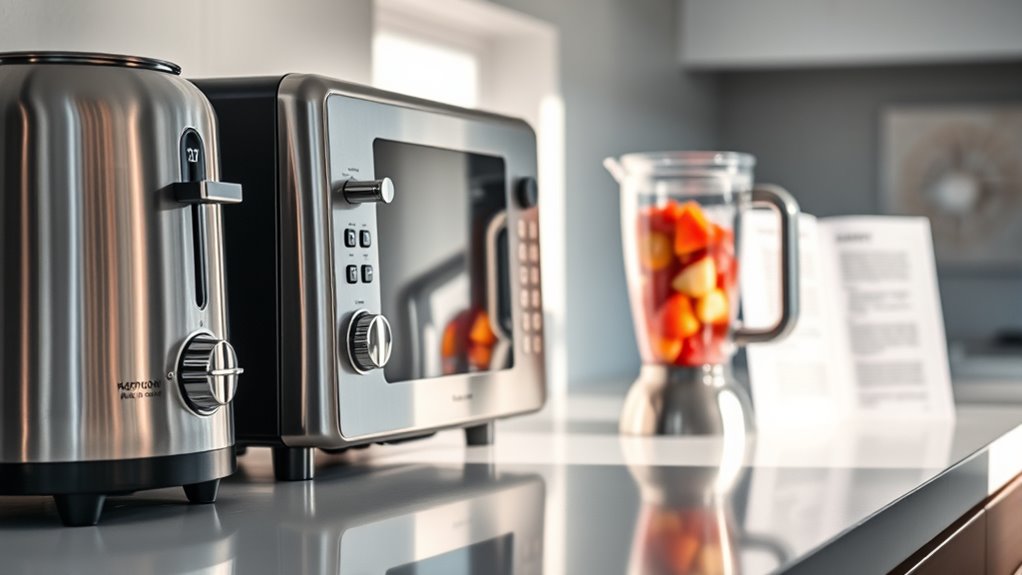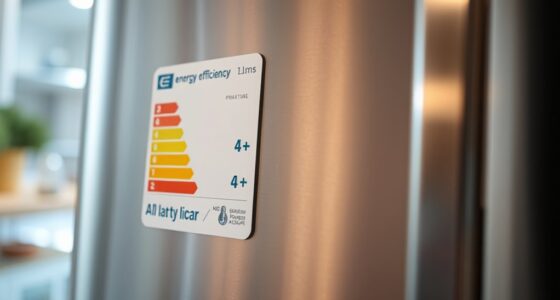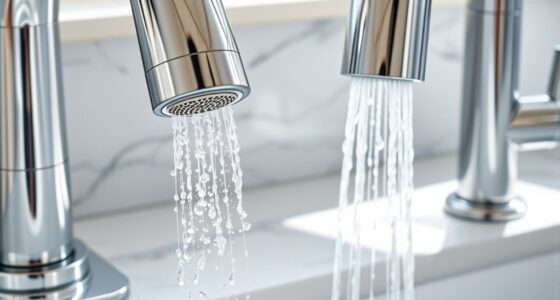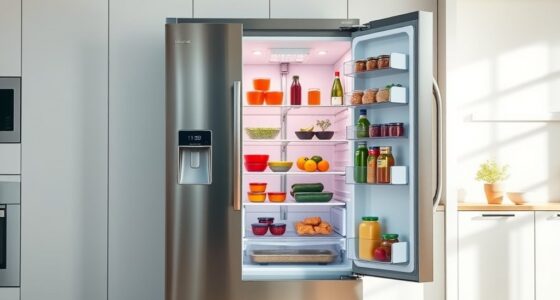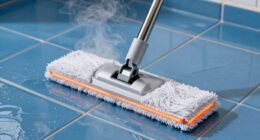When considering appliance warranties, it’s essential to understand what they actually cover—typically repairs for manufacturing defects, but exclusions like cosmetic damage, accidental breakage, or normal wear are common. Manufacturer warranties are usually limited in time, while extended plans often have hidden costs and restrictions that may not be worth it. To avoid waste, evaluate your appliance’s age and reliability, and explore alternatives like DIY fixes or insurance. Keep going to learn more about making smart coverage choices.
Key Takeaways
- Understand that manufacturer warranties cover specific defects but often exclude accidental damage, wear and tear, or cosmetic issues.
- Extended warranties may seem beneficial but often have hidden costs, limited coverage, and may not be necessary for new, reliable appliances.
- Proper registration and documentation are essential to ensure warranty claims are processed smoothly and efficiently.
- Evaluate whether your appliance’s age, reliability, and repair history justify purchasing an extended service plan.
- DIY repairs and dedicated savings can sometimes be smarter, more cost-effective alternatives to expensive warranty plans.
Understanding What Appliance Warranties Cover
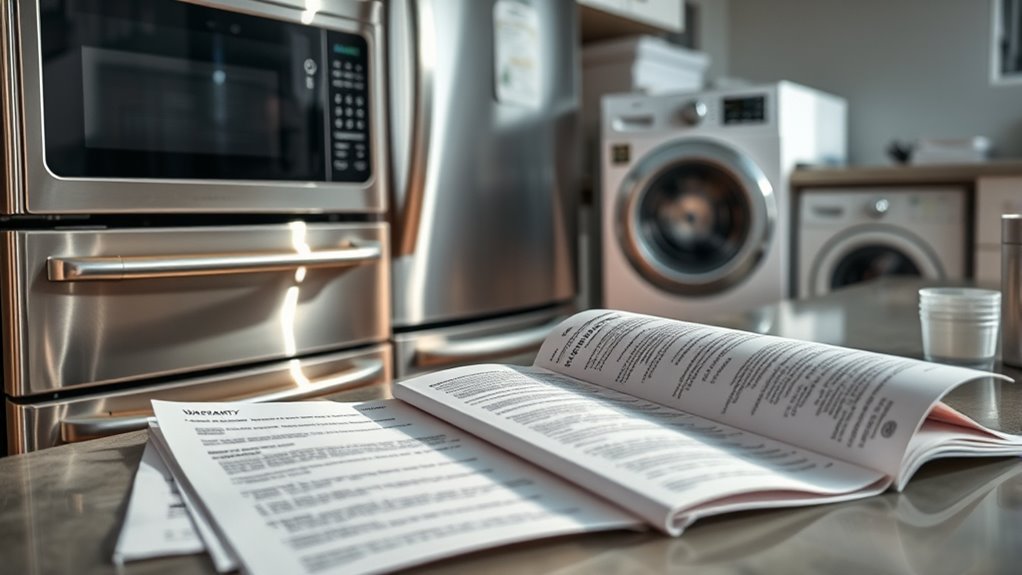
Understanding what appliance warranties cover is essential before making a purchase. Warranties generally protect against defects that affect product longevity, ensuring your appliance functions properly for a set period. They typically cover repairs or replacements for parts that fail due to manufacturing issues but often exclude damage caused by misuse or accidents. To maximize your warranty benefits, you should register your appliance promptly after buying it. Warranty registration confirms your purchase and makes it easier to claim repairs if needed. Knowing exactly what your warranty covers helps you avoid surprises and unnecessary costs down the line. Keep detailed records of your registration and any repairs to ensure smooth service if problems arise. Being informed about warranty coverage helps you safeguard your investment and extend your appliance’s lifespan. Incorporating mindfulness practices, such as visualization techniques, can also help you stay calm and focused when navigating warranty claims or service processes.
The Difference Between Manufacturer and Extended Warranties

When choosing appliance coverage, it’s important to know the key differences between manufacturer warranties and extended warranties. Manufacturer warranties typically come standard with your appliance, offering basic coverage for a limited time. Extended warranties, on the other hand, are optional plans you purchase later to prolong protection. Many warranty myths surround extended plans—like thinking they always cover more, which isn’t true. Coverage nuances matter: manufacturer warranties often exclude certain damages or repairs, while extended warranties might offer broader coverage but with restrictions. Understanding digital literacy and critical thinking skills can help you evaluate warranty options more effectively. You should consider:
Understanding warranty differences helps you choose the best appliance protection plan.
- Manufacturer warranties usually have shorter durations
- Extended warranties can be more all-encompassing but cost more
- Understanding coverage nuances helps avoid surprises and wasted money
Common Exclusions and Limitations to Watch For
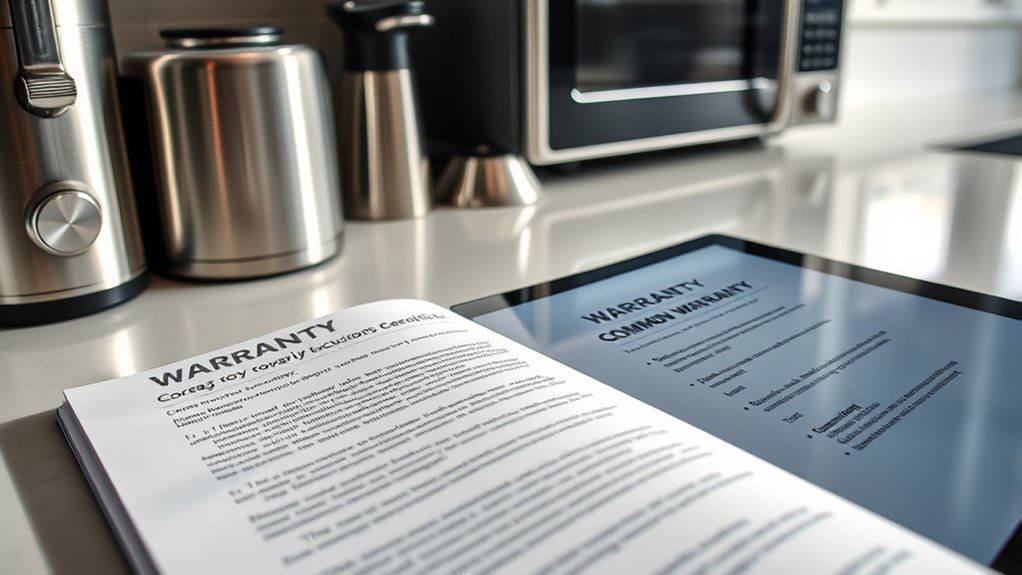
While extended warranties can offer broader coverage than manufacturer plans, they also come with specific exclusions and limitations you should be aware of. Many warranties exclude cosmetic damage, meaning scratches or dents aren’t covered unless they affect functionality. Accidental breakage is often not included, so if you drop or mishandle your appliance, repairs or replacements may fall on you. Additionally, some warranties limit coverage to certain parts or types of failures, excluding issues caused by user error or environmental factors. It’s essential to read the fine print carefully, as these exclusions can considerably reduce the protection you think you’re getting. Knowing what’s not covered helps you avoid surprises and decide if the warranty is worth the investment. Understanding warranty coverage can help you determine whether an extended warranty is a worthwhile investment or if it’s better to set aside funds for potential repairs.
When to Rely on the Manufacturer’s Warranty
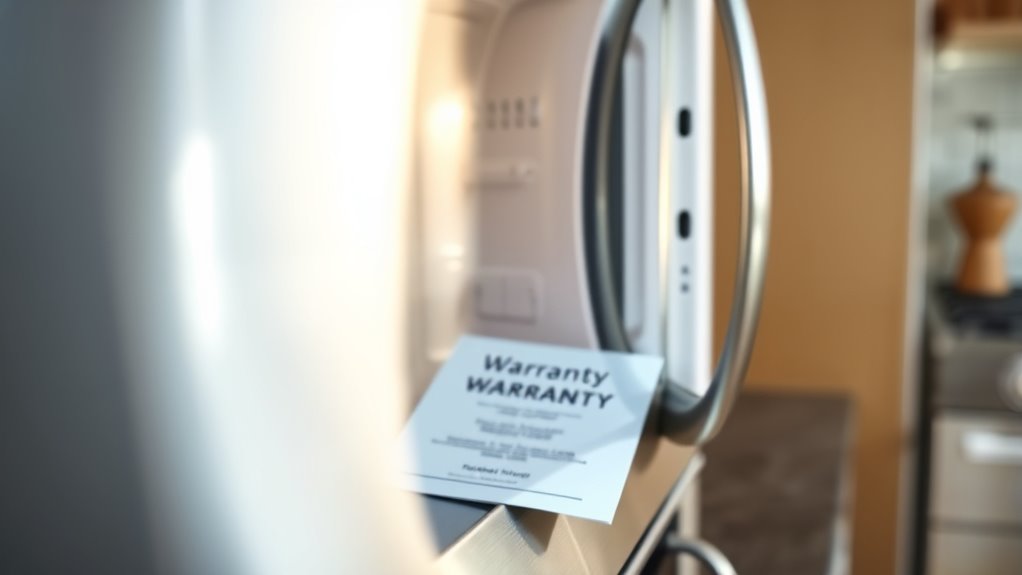
You should rely on your manufacturer’s warranty when your appliance breaks down within the coverage limits. Make sure you have proper documentation, like your receipt and warranty card, ready to prove your claim. Understanding these details helps you determine if the warranty can cover your repair or replacement. Additionally, familiarize yourself with the warranty terms, as they specify what is and isn’t covered under the agreement.
Warranty Coverage Limits
Ever wonder if your appliance is still covered under the manufacturer’s warranty? It’s essential to understand the coverage limits, as warranties often have specific timeframes or usage caps. Once these limits are reached, you’ll need to pay out of pocket, even if the appliance fails prematurely. Be aware of coverage gaps that may leave you vulnerable to unexpected costs. Sometimes, warranty fraud can occur if repairs aren’t properly documented or if false claims are made, risking the validity of your coverage. Additionally, understanding the Vetted – Grobal World can help you identify reliable warranties and avoid scams. To stay protected:
- Keep track of warranty expiration dates
- Read the fine print for usage restrictions
- Document repairs meticulously to avoid coverage disputes
Proper Documentation Needed
Having proper documentation is essential when claiming warranty coverage, as it provides proof that your appliance is eligible for repairs or replacements. Always keep your warranty registration confirmation, which verifies you’ve registered the product with the manufacturer. This step often streamlines the repair process and guarantees your warranty is active. Additionally, keep your proof of purchase, such as a receipt or invoice, handy. Without it, the manufacturer might question the warranty’s validity or refuse service. When contacting customer service, having these documents ready saves time and prevents unnecessary delays. Remember, manufacturers typically require proof of purchase to confirm the purchase date and warranty period. Staying organized with these documents ensures you’re prepared to support your claim when needed. Contrast ratio and other image quality factors can influence the longevity and performance of your projector, making proper warranty coverage even more important.
Evaluating the Value of Extended Service Plans
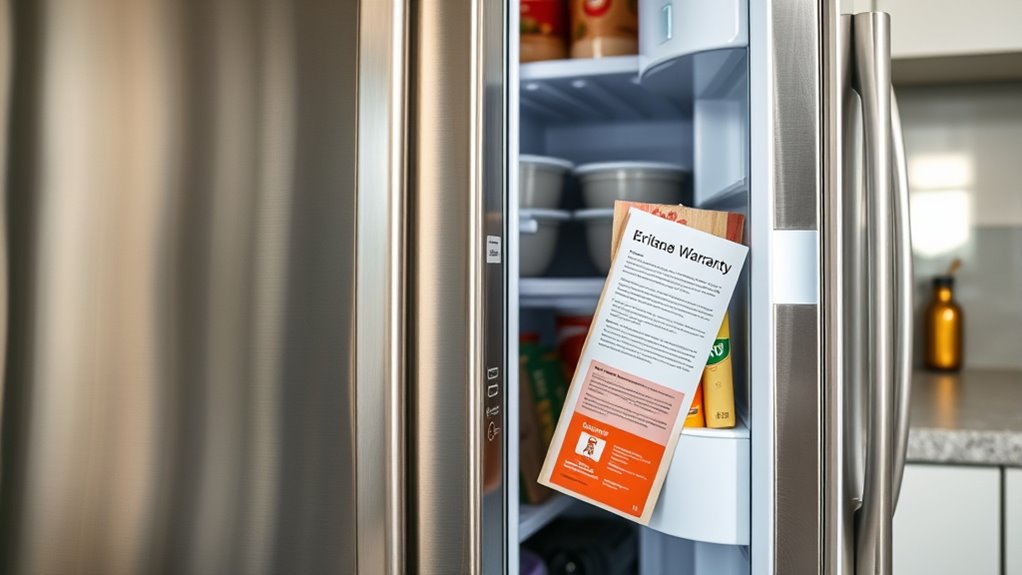
Is purchasing an extended service plan worth the extra cost? It depends on your appliance’s age, reliability, and how much peace of mind matters to you. Extended coverage can provide valuable protection against unexpected repairs, but only if the cost benefit aligns with your situation.
Deciding on an extended service plan depends on your appliance’s age, reliability, and peace of mind needs.
Consider these points:
- If your appliance is older, an extended plan might save you money in the long run.
- For newer models with a strong reputation, the plan might be unnecessary.
- Think about your comfort with potential repairs and out-of-pocket expenses.
Ultimately, evaluate whether the plan’s coverage justifies its price. Sometimes, the peace of mind it offers outweighs the cost, but in other cases, it’s better to save that money for repairs down the line.
Signs That an Extended Warranty Might Be Worth It
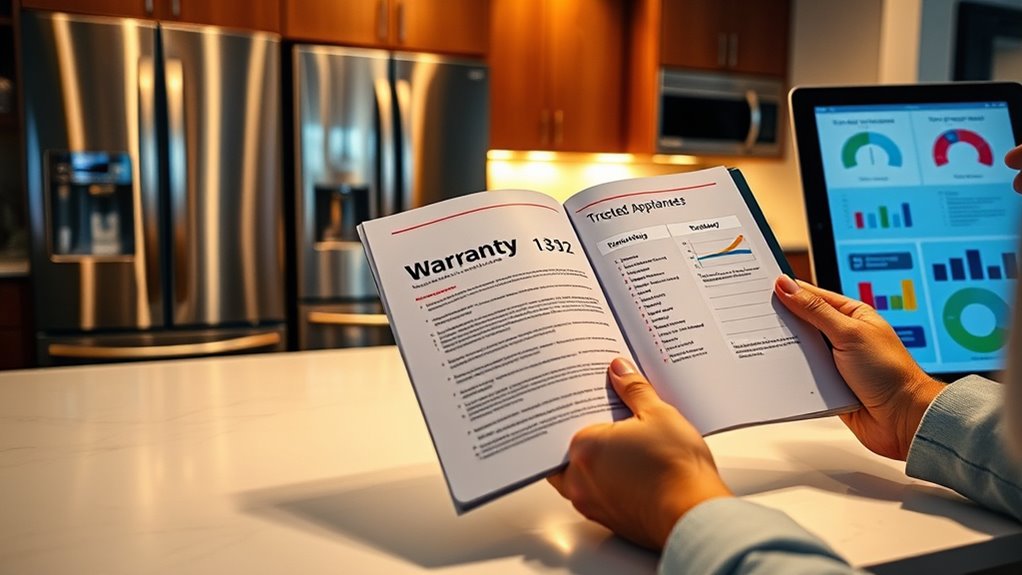
If your appliance costs a lot to replace, an extended warranty could save you money in the long run. A history of frequent repairs also suggests it might be worth investing in extra coverage. Additionally, if the manufacturer’s warranty is limited, an extended plan can provide more all-encompassing protection. Given the increasing reliance on AI in retail, ensuring your appliances are well-covered can prevent unexpected expenses that disrupt your household budget.
High-Value Appliance Cost
Extended warranties for high-value appliances can be a smart investment when the upfront cost is significant and repairs could be costly. If your appliance has limited longevity or if repair expenses are likely to be high, an extended warranty might save you money in the long run. Keep in mind the warranty myths that sometimes overstate benefits or cover only minor issues. Recognizing Angel Number Soulmate signs can also help you determine if investing in a warranty aligns with your long-term relationship and life plans.
Signs that it’s worth considering include:
- The appliance is expensive to replace or repair
- You plan to keep the appliance for many years
- You’re concerned about unexpected breakdown costs
If you’re wary of repair costs piling up and want peace of mind, an extended warranty could be a wise choice. Just make sure you’re not paying for coverage you don’t need, especially if appliance longevity is uncertain.
Frequent Repair History
When your appliance has a history of frequent repairs, it’s worth considering an extended warranty. High repair frequency can considerably shorten its effective appliance lifespan, leading to more breakdowns and higher costs over time. If you notice your appliance needs repairs often, it indicates underlying issues that might persist or worsen. An extended warranty can provide peace of mind, covering future repairs that become more likely as the appliance ages. This is especially true if the appliance is already showing signs of wear or past frequent fixes. By investing in an extended warranty, you protect yourself from unpredictable expenses and ensure your appliance remains operational longer, despite its repair history. Regular maintenance and understanding industry trends can also help in making informed warranty decisions. It’s a smart move when repair frequency suggests ongoing problems.
Limited Manufacturer Warranty
Limited manufacturer warranties often fall short in covering long-term repairs, making it wise to contemplate an extended warranty if you notice certain signs. Manufacturer limitations and warranty exclusions can leave you unexpectedly responsible for costly repairs. If your appliance is older or has a history of issues, the basic warranty might not be enough. Additionally, read the fine print—some warranties exclude parts prone to wear and tear, which can catch you off guard. When you see these signs, an extended warranty could offer peace of mind and save you money later on. For example, damage from regular use is often not covered, leaving you vulnerable to ongoing costs.
Hidden Costs and Pitfalls of Purchasing Extra Coverage
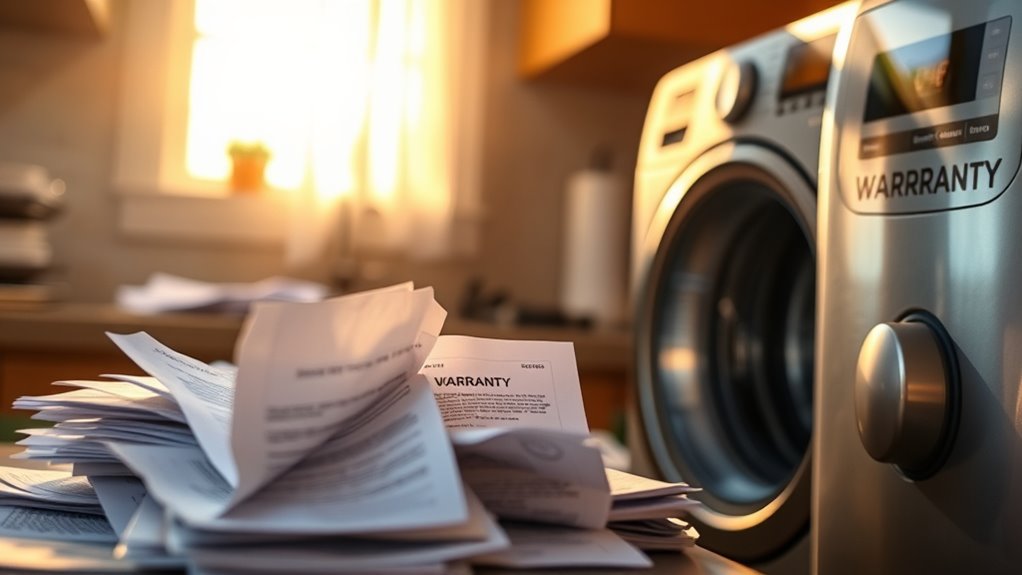
While purchasing extra coverage can seem like a smart way to avoid unexpected repair costs, it often comes with hidden expenses that catch consumers off guard. Many plans include hidden fees or coverage gaps that reduce their value. For example, you might pay for coverage that excludes common repairs or has high deductibles. To illustrate, consider the following:
| Hidden Fees | Coverage Gaps |
|---|---|
| Activation charges | Excludes certain parts |
| Service call fees | Limited repair scope |
| Cancellation penalties | Doesn’t cover wear and tear |
These pitfalls can make extra coverage a waste of money if you’re not careful. Always read the fine print, and be wary of plans that seem too good to be true.
Alternatives to Warranties: DIY Repairs and Insurance Options
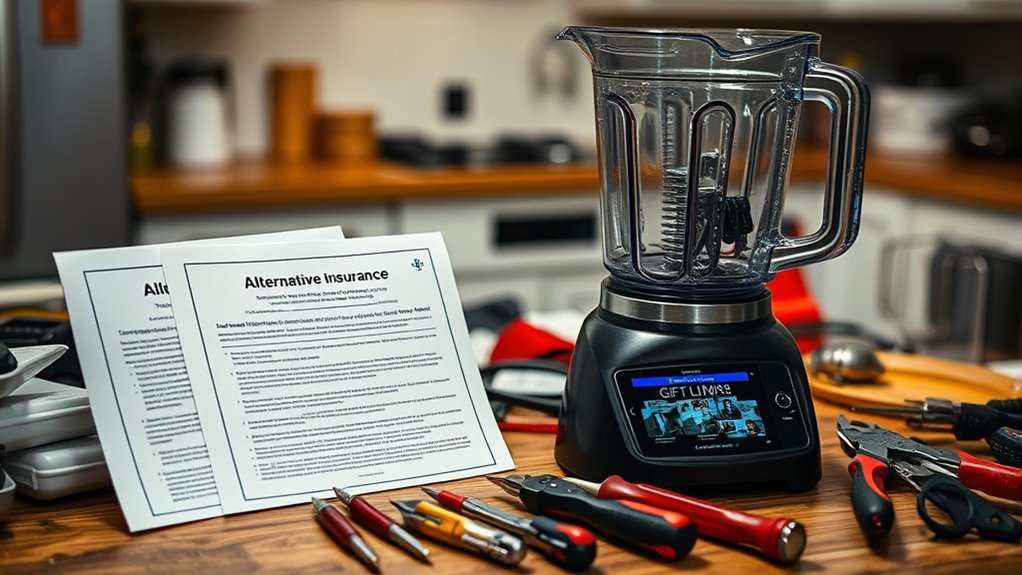
Instead of relying solely on extended warranties, you can explore DIY repairs and insurance options to protect yourself from unexpected expenses. DIY repairs allow you to troubleshoot simple issues yourself, saving money and time. Learning basic repair skills can help you fix minor problems without waiting for a technician or paying extra. Insurance options provide a safety net for major appliance failures, often with lower premiums than extended warranties. These policies can cover costly repairs or replacements when DIY fixes aren’t enough.
Consider these alternatives:
- DIY repair tutorials and online resources for troubleshooting common issues
- Specialized appliance insurance plans that fit your needs
- Savings accounts dedicated to appliance repairs, giving you control over repair costs
These strategies can give you more control and potentially save you money.
Making Informed Decisions: Tips for Smart Appliance Shopping

Shopping for appliances requires careful research and consideration to guarantee you make a smart investment. Start by checking the appliance’s reputation for reliability and ease of appliance maintenance, which can save you money and hassle later. Always review the manufacturer’s track record for product recalls to avoid safety risks and costly repairs. Compare features and prices across brands, but don’t overlook warranty details—sometimes a longer warranty isn’t worth the extra cost if the product is prone to recalls or issues. Read customer reviews to spot common problems. By staying informed about potential recalls and understanding what routine appliance maintenance involves, you can select appliances that offer durability and safety, ensuring your investment pays off in the long run.
Frequently Asked Questions
How Do I Determine if My Appliance Needs a Warranty Extension?
To decide if your appliance needs an extended coverage, first consider its age and repair history. If it’s new and reliable, extra warranty might be unnecessary. However, if it’s older or prone to issues, an extension could offer peace of mind. Weigh the cost benefit carefully—sometimes paying for repairs out-of-pocket is cheaper than an extended warranty. Ultimately, assess your comfort with potential repair costs and how much you value added security.
Are There Specific Brands Known for Better Warranty Coverage?
Think of warranty coverage like a safety net—some brands craft sturdier ones than others. You’ll want to check brand reputation and warranty duration to see who offers the strongest protection. Brands like Samsung, LG, and Whirlpool are known for reliable warranties that last longer. By choosing these, you get peace of mind knowing your appliance is protected, and you won’t be left hanging when issues arise.
What Are the Typical Timeframes for Manufacturer Warranties?
You’re probably wondering about typical warranty durations for appliances. Most manufacturer warranties last around one year, but some offer extended coverage up to five years or more. These warranties often cover parts and labor, giving you peace of mind. Be sure to check the warranty duration before buying and consider if extended coverage makes sense for your needs. Knowing the typical timeframes helps you decide if additional protection is worth it.
Can Warranties Be Transferred if I Sell My Appliance?
Think of warranties as a gift you give with your appliance—sometimes, you can pass that gift along. Transferable benefits allow you to hand over the warranty when you sell, adding value for the new owner. But watch out for warranty limitations; some warranties aren’t transferable, leaving the next buyer in the rain. Always check your warranty’s fine print before passing the torch, so you don’t get caught empty-handed.
How Does Warranty Coverage Differ for New Versus Refurbished Appliances?
When comparing warranties for new versus refurbished appliances, you’ll find that new appliances often come with extensive coverage, including extended service plans and protection against accidental damage. Refurbished appliances might have limited warranties that exclude accidental damage or extended service options. Always check what’s included, as new appliances tend to offer better peace of mind with full coverage, while refurbished units may require you to purchase additional protection plans.
Conclusion
Think of appliance warranties as your trusted map on a journey—you need to know where it helps and where it might lead you astray. By understanding what’s covered and spotting hidden pitfalls, you steer clear of dead ends. Arm yourself with knowledge, explore alternatives, and make savvy choices. When you’re in control of the terrain, you’ll navigate appliance shopping with confidence, ensuring your investment keeps you smoothly sailing ahead, not stuck in the storm.
